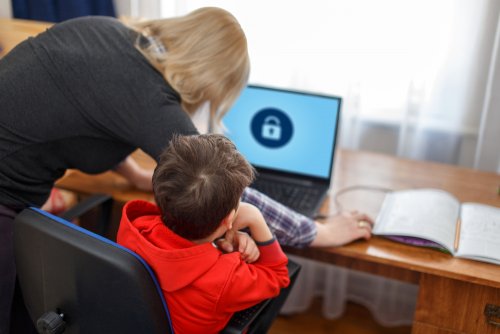Parental Controls in the Digital Age

Children use the Internet from an early age nowadays, which is why parental controls are important. In fact, it isn’t unusual to see two-year-old children watching their favorite cartoon videos on YouTube.
As they grow, this use becomes more extensive, as does their curiosity to discover all the things that new technologies can offer them. Regardless of the innumerable advantages and disadvantages of children’s Internet use, you must be aware that new technologies are part of their lives.
Thus, it’s necessary for adults to know how to teach their children the best way to use them. To do this, one of the great allies adults should rely on is parental controls.
Today, we’ll talk a little more about this option that electronic devices offer. This way, adults and children can enjoy new technologies with more peace of mind.

What are parental controls?
Although many adults currently use them, a large part of the population doesn’t know the meaning of “parental controls” and the possibilities this tool offers. As the name suggests, it’s the controls that the parents or adults around a child apply to the electronic devices the child uses.
This tool has been expanded and developed to offer great benefits. With parental controls, adults can restrict or block the electronic devices their child is using. In addition to the devices, they can also block specific searches, applications, or purchases.
Depending on the device they’re using, since even televisions or DVD players have the option of activating parental controls, parents or adults apply these restrictions in a different way.
However, the most-used methods so that the child can’t access specific contents are fingerprint or facial recognition or a specific password.
An educational and conscious use
The Internet offers children thousands of beneficial content. However, hundreds of thousands more aren’t, despite the fact that they draw their attention. One of the best examples is the application of parental controls in games that are downloaded to cell phones.
On many occasions, children download certain games for free that also offer in-app purchases to advance faster in the game. Children who aren’t aware of these purchases can make them, which can be a big problem for adults.
For this reason, parental controls are a fantastic tool for children to enjoy the Internet in a fully controlled way without any problems.
Other ways to control Internet use
Improper or excessive Internet use can cause a child serious problems. For this reason, from the first time you give your children permission to use technologies, it’s good to agree on a series of guidelines with them.
These guidelines should depend on their age, as well as how they can use certain social networks or applications that are more common in certain ages.

Establish a schedule or time
The first guideline that you must agree on with your children is an Internet use schedule. This way, they’ll be aware that they can’t be connected at all times.
You can delimit this schedule for every day, once a week, or even monthly. Also, it’s very common to only let children use the Internet on weekends so it doesn’t affect their school performance.
Determining places of use is a complement to parental controls
Nowadays, it’s very common to see children completely absorbed in their cell phones or other electronic devices in public leisure places such as restaurants or bars. This is also quite common in places like parks, spaces especially made for children to have fun and where they shouldn’t use technology.
For this reason, it’s advisable to determine certain places of use. For example, you can restrict the use of technologies to when children are at home. Thus, they can’t use them in places where they can enjoy other children’s company or other activities.
By establishing these guidelines and others that you may consider especially convenient for your children, you’ll be encouraging them to use the Internet in a responsible way.
Children use the Internet from an early age nowadays, which is why parental controls are important. In fact, it isn’t unusual to see two-year-old children watching their favorite cartoon videos on YouTube.
As they grow, this use becomes more extensive, as does their curiosity to discover all the things that new technologies can offer them. Regardless of the innumerable advantages and disadvantages of children’s Internet use, you must be aware that new technologies are part of their lives.
Thus, it’s necessary for adults to know how to teach their children the best way to use them. To do this, one of the great allies adults should rely on is parental controls.
Today, we’ll talk a little more about this option that electronic devices offer. This way, adults and children can enjoy new technologies with more peace of mind.

What are parental controls?
Although many adults currently use them, a large part of the population doesn’t know the meaning of “parental controls” and the possibilities this tool offers. As the name suggests, it’s the controls that the parents or adults around a child apply to the electronic devices the child uses.
This tool has been expanded and developed to offer great benefits. With parental controls, adults can restrict or block the electronic devices their child is using. In addition to the devices, they can also block specific searches, applications, or purchases.
Depending on the device they’re using, since even televisions or DVD players have the option of activating parental controls, parents or adults apply these restrictions in a different way.
However, the most-used methods so that the child can’t access specific contents are fingerprint or facial recognition or a specific password.
An educational and conscious use
The Internet offers children thousands of beneficial content. However, hundreds of thousands more aren’t, despite the fact that they draw their attention. One of the best examples is the application of parental controls in games that are downloaded to cell phones.
On many occasions, children download certain games for free that also offer in-app purchases to advance faster in the game. Children who aren’t aware of these purchases can make them, which can be a big problem for adults.
For this reason, parental controls are a fantastic tool for children to enjoy the Internet in a fully controlled way without any problems.
Other ways to control Internet use
Improper or excessive Internet use can cause a child serious problems. For this reason, from the first time you give your children permission to use technologies, it’s good to agree on a series of guidelines with them.
These guidelines should depend on their age, as well as how they can use certain social networks or applications that are more common in certain ages.

Establish a schedule or time
The first guideline that you must agree on with your children is an Internet use schedule. This way, they’ll be aware that they can’t be connected at all times.
You can delimit this schedule for every day, once a week, or even monthly. Also, it’s very common to only let children use the Internet on weekends so it doesn’t affect their school performance.
Determining places of use is a complement to parental controls
Nowadays, it’s very common to see children completely absorbed in their cell phones or other electronic devices in public leisure places such as restaurants or bars. This is also quite common in places like parks, spaces especially made for children to have fun and where they shouldn’t use technology.
For this reason, it’s advisable to determine certain places of use. For example, you can restrict the use of technologies to when children are at home. Thus, they can’t use them in places where they can enjoy other children’s company or other activities.
By establishing these guidelines and others that you may consider especially convenient for your children, you’ll be encouraging them to use the Internet in a responsible way.
This text is provided for informational purposes only and does not replace consultation with a professional. If in doubt, consult your specialist.








